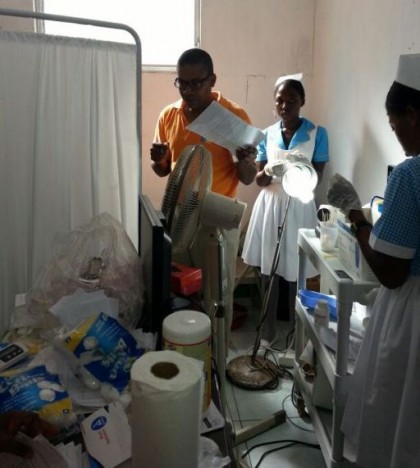
On International Women’s Day, March 8, Radio France Internationale’s Atelier de Medias posted a piece highlighting I-TECH’s work to fight cervical cancer in Haiti. The following is a summary of the post.
According to the World Health Organization (WHO), cervical cancer is the second most common cancer in women worldwide and remains a leading cause of death, with approximately 86% of new cases and deaths occurring in middle- and low-income countries.1 Among women who die from this disease, the percentage of them from developing countries has increased from 80% in 2002 to 88% in 2008, and it may reach 98% by 2030.2
Haiti — a country with limited resources and a population of 10 million — is no exception. Currently, it is estimated that, every year, 568 women are diagnosed with cervical cancer in Haiti, and 353 of them succumb to the cancer.3 According to the WHO, if nothing is done by 2025, there will be an approximately 55% increase in cases of cervical cancer in Haiti.
In answer to this threat, the Haitian Ministry of Public Health and Population (MSPP), through the Direction of Family Health (DSF), launched a Cervical Cancer Prevention program in Haiti. Since 2011, I-TECH — with funding from the U.S. Health Resources and Services Administration through the U.S. President’s Emergency Plan for AIDS Relief, or PEPFAR — has supported DSF/MSPP in facilitating the training of trainers (ToT) and participating actively in the drafting of standards for screening and treatment of precancerous lesions on the cervix.
In March 2013, I-TECH in collaboration with Dr. Frantz Montès from MSPP and two other Haitian experts, Dr. Christophe Millien and Dr. Eddy Jonas from Partners in Health/Zanmi Lasante, conducted a training in visual inspection with acetic acid (VIA) and cryotherapy for caregivers from these institutions.
This program grew under the leadership of I-TECH’s Technical Director Dr. Jean Guy Honoré. In December 2013, I-TECH began to assist institutions in implementing the program, and in the months that followed, it was launched at six institutions across the country. This has resulted in hundreds of patients screened, several of whom have received cryotherapy and cervical biopsies.
The full text of the article (in French) can be found at http://atelier.rfi.fr/profiles/blogs/halte-au-cancer-du-col-en-ha-ti-i-tech-s-investit.
Sources:
1. Human Papillomavirus and Related Cancers in Haiti. Summary Report 2010. World Health Organization / ICO Information Centre on HPV and Cervical Cancer HPV (HPV Information Centre), 2012. Accessed on May 25, 2014.
2. Strategies for cervical cancer prevention using visual inspection with acetic acid and cryotherapy treatment screening. Report of the PAHO workshop for Latin America and the Caribbean. Guatemala City, June 1-2, 2011. Washington, DC: Pan American Health Organization, 2011.
3. Globocan 2008: Cancer Incidence and Mortality Worldwide. International Agency for Research on Cancer / World Health Organization, 2010.